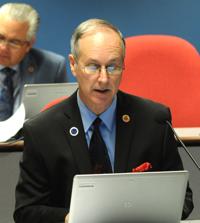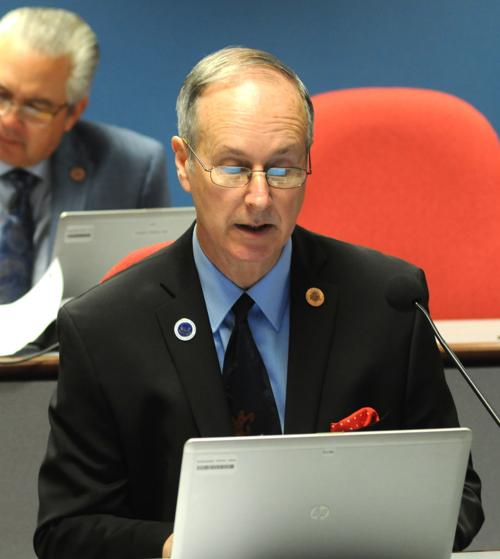PHOENIX — The way Rep. Bob Thorpe sees it, it’s illegal for foreigners to try to use their money to influence elections in this country.
So the Flagstaff Republican wants to enact the same law here — but with a twist. His House Bill 2718 would make it a crime for anyone who does not live in Arizona to contribute to campaigns for or against candidates and for or against ballot measures.
Put simply, Thorpe does not want out-of-staters influencing Arizona politics and policies.
An attorney with expertise in state election law said the idea “makes a lot of sense.”
“For example, you can’t vote if you are not a resident of Arizona and a citizen,” said Tom Collins, executive director of the Citizens Clean Elections Commission. “Likewise, you might think that it would follow that if you’re going to be spending money on elections, you ought to also be from Arizona.”
But Collins said Thorpe’s proposal is very likely unconstitutional.
Thorpe conceded that Collins may be right. But he said he hopes the Legislature enacts his proposal anyway as a method of mounting a legal challenge, one that likely would have to be resolved by the U.S. Supreme Court.
The proposal says that a person who is a resident of another state, or any corporation whose domicile or incorporation is in another state, “shall not make a contribution to any committee located in this state or any person or candidate for office in this state.”
Thorpe calls it a matter of common sense, saying it curbs the influence of someone from another state who might have millions of dollars to spend and finances an initiative drive to change Arizona law.
“It might be really terrible legislation, terrible law” that the out-of-staters shore up, he said.
“They never have to live under the consequences of bad laws that they help enact,” Thorpe said. “And so I think that’s extremely unfair.”
Thorpe cited the $24.1 million put into the Proposition 127 campaign in 2018 to increase the requirements on utilities to use renewable energy.
That money came largely from NextGen Climate Action, a political action committee founded by California billionaire Tom Steyer. It was defeated with a $40 million campaign financed largely by Pinnacle West Pinnacle West Capital Corp., parent company of Arizona Public Service.
Thorpe’s legislation would keep the cash from NextGen out of Arizona, though he said Steyer, now running for the Democratic presidential nomination, would remain free to come to the state and espouse his ideas.
But as his bill is written, Pinnacle West, incorporated in Arizona, could spend what it wanted. He said the distinction is justified.
“Do we want people to influence our elections here in Arizona that never have to live under the consequences of bad outcome?” Thorpe asked.
Less clear is the issue of multi-state corporations with a major Arizona presence, companies like Raytheon, Wells Fargo and Kroger, the last being the parent company of Fry’s grocery stores.
“My bill doesn’t even try to determine that,” Thorpe said. “That would be something that would need to be fought in the courts and defined in the courts — or defined by future legislatures.”
And Thorpe said his measure does not address so-called independent expenditures, money given not to candidates themselves but spent on advertising advocating their election or the defeat of their foes.
For example, the Republican Governors Association spent nearly $9.6 million in 2018 to secure the reelection of Gov. Doug Ducey, much of that with advertising aimed at Democratic challenger David Garcia. But the reports to the state do not disclose where the RGA got its money and how much of that came from out-of-state donors.
Collins said there are legal ways to limit the ability of candidates to take funds from out-of-state residents.
He pointed out that the Citizens Clean Elections Act allows candidates for statewide and legislative office to get public financing for their campaigns if they agree not to take money from special interests and political action committees.
But to qualify, candidates have to gather a certain number of $5 donations to show they have some public support.
Those dollars can come only from Arizonans who are registered to vote. And, in the case of legislative candidates, the funds have to come from those living in the same district.
What makes that legal, Collins said, is that the program is voluntary.
Candidates remain free to choose to solicit private dollars. And Collins said he doubts that curbs can be placed on where they get their money.
“I think that what a court would likely say is, look, folks who live in New Mexico or California or New York or Washington, D.C. may have an interest in the policies that the state has on commerce or the policies the state has,” he said.
Perhaps, Collins said, they have a business that is incorporated in California but with operations in Arizona.
“So they have an interest there in making their case and supporting those candidates that reflect their position,” he said. “I think that the courts would see that as part of First Amendment rights.”
So far legislative leadership has declined to assign Thorpe’s measure to a committee for a hearing.





